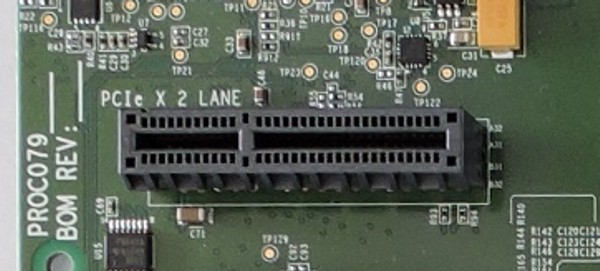SPRUIW7A October 2020 – February 2022
- Trademarks
- 1Introduction
- 2J7200 EVM Overview
- 3EVM User Setup/Configuration
-
4J7200 EVM Hardware Architecture
- 4.1 J7200 EVM Hardware Top Level Diagram
- 4.2 J7200 EVM Interface Mapping
- 4.3 I2C Address Mapping
- 4.4 GPIO Mapping
- 4.5 Power Supply
- 4.6 Reset
- 4.7 Clock
- 4.8 Memory Interfaces
- 4.9 MCU Ethernet Interface
- 4.10 QSGMII Ethernet Interface
- 4.11 PCIe Interface
- 4.12 USB Interface
- 4.13 Audio Interface
- 4.14 CAN Interface
- 4.15 FPD Interface (Audio Deserializer)
- 4.16 I3C Interface
- 4.17 ADC Interface
- 4.18 RTC Interface
- 4.19 Apple Authentication Header
- 4.20 JTAG Emulation
- 4.21 EVM Expansion Connectors
- 4.22 ENET Expansion Connector
- 5Functional Safety
- 6Revision History
4.11.1 X2 Lane PCIe Interface
The x2 lane PCIe interface includes one x4 lane PCIe connector of part number Amphenol 10142333-10111MLF, which supports PCIe Gen4 operation. The pin-out of the connector follows PCIe standard.
The SERDES0 port of J7 SoC is connected to x2 lane PCIe socket for data transfer. PCIe1, USB0_SS and SGMII3, 4 interfaces are pinmuxed with this SERDES0 port.
 Figure 4-20 PCIe Interface SERDES0
Figure 4-20 PCIe Interface SERDES0I2C0 from SoC is used for control purpose and is connected to SMBUS on the connector through I2C switch. The link activation signal (INT#) from both the X1 and X2 lane PCIe connectors is terminated to I2C switch.
Reset: A dip Switch (SW3) is provided to select the reset source for Root Complex and End-point PCIe operation.
In case of RC mode, signal from GPIO Expander and PORz signals from SoC are ANDed and the output is connected to PCIe connector. The GPIO signal is pulled low to ensure PCIe Reset (#PERST) remains asserted until SoC releases reset.
Whereas, in case of PCIe end point operation, the CP board receives reset signal from the PCIe card.
 Figure 4-21 2L-PCIe Root Complex/Endpoint
Selection Circuit
Figure 4-21 2L-PCIe Root Complex/Endpoint
Selection CircuitClock: A clock generator (CDCI #1) is provided to drive 100MHz HCSL clock for PCIe add on cards and J7200 SoC. Resistor options are provided to select the clock source for host and end point operation.
For PCIe RC operation:
- The add on cards can have clocks driven by SOC or clock generator. Selection can be made through resistors as shown in Table 4-15.
| Clock Selected | Mount | Unmount |
|---|---|---|
| Reference Clock for SOC from clock generator | R214 | R211, C44 |
| R213 | R210, C51 | |
| Reference Clock for PCIe connector from SOC | R211, C44 | R214, R54 |
| R210, C51 | R213, R56 | |
| Reference Clock for PCIe connector from clock generator | R54 | R211, C44 |
| R56 | R210, C51 |
For PCIe Endpoint operation:
- The SOC can have the clock driven by add on cards or clock generator. Selection can be made through resistors as shown in Table 4-16.
| Clock Selected | Mount | Unmount |
|---|---|---|
| Reference clock for SOC from clock generator | R214 | R211, C44 |
| R213 | R210, C51 | |
| Reference clock for SOC from PCIe connector | R211, C44 | R214, R54 |
| R210, C51 | R213, R56 |
Hot plug: The PRSNT1# and PRSNT2# signals are the hot plug presence detect signals. The PRSNT1# is pulled up and PRSNT2# is connected to GPIO expander, so that PRSNT1# will be pulled low when a add on card is plugged in as both the PRSNT signals in add on cards will be shorted. Optional resistor is provided to short the PRSNT1# and PRSNT2# to support host and device mode
- For choosing Host or device operation of PCIe card, following resistors must be mounted/unmounted as mentioned in Table 4-17.
| Mode | Mount | Demount |
|---|---|---|
| Host mode | R631 | R630 |
| R638 | ||
| Device mode | R630 | R631 |
| R638 |